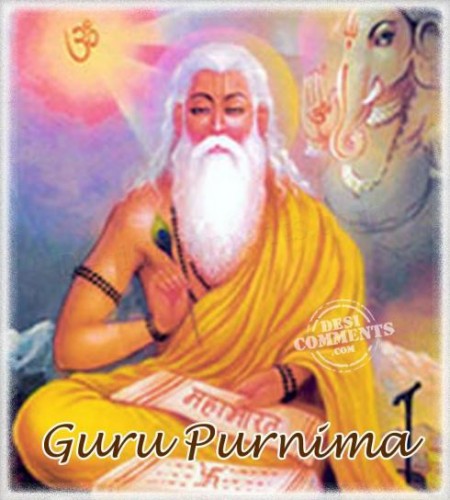 Happy Guru Purnima – Date 12 July 2014. Thanks to My Gurus Academic and professional
Happy Guru Purnima – Date 12 July 2014. Thanks to My Gurus Academic and professional
Guru Purnima – Date 12 July 2014.
Guru Purnima is a Hindu festival dedicated to spiritual and academic teachers. This festival traditionally celebrated by Hindus and Buddhists, to thank their teachers. It is marked by ritualistic respect to the Guru, Guru Puja.
The Guru Principle is a thousand times more active on the day of Gurupournima than on any other day.
The word Guru is derived from two words, ‘Gu’ and ‘Ru’. The Sanskrit root “Gu” means darkness or ignorance. “Ru” denotes the remover of that darkness. Therefore one who removes darkness of our ignorance is a Guru. Gurus are believed by many to be the most necessary part of lives.
On this day, disciples offer puja (worship) or pay respect to their Guru (Spiritual Guide). It falls on the day of full moon, Purnima, in the month of Ashadh (June–July) of the Shaka Samvat, Indian national calendar and Hindu calendar.
In addition to having religious importance, this festival has great importance for Indian academics and scholars. Indian academics celebrate this day by thanking their teachers as well as remembering past teachers and scholars.
Traditionally the festival is celebrated by Buddhists in honor of the lord Buddha who gave His first sermon on this day at Sarnath, Uttar Pradesh, India. In the yogic tradition, the day is celebrated as the occasion when Shiva became the first Guru, as he began the transmission of yoga to the Saptarishis.
Many Hindus celebrate the day in honor of the great sage Vyasa, who is seen as one of the greatest gurus in ancient Hindu traditions and a symbol of the Guru-shishya tradition. Vyasa was not only believed to have been born on this day, but also to have started writing the Brahma Sutras on ashadha sudha padyami, which ends on this day. Their recitations are a dedication to him, and are organised on this day, which is also known as Vyasa Purnima.
The festival is common to all spiritual traditions in Hinduism, where it is an expression of gratitude toward the teacher by his/her disciple.
Hindu ascetics and wandering monks (sanyasis), observe this day by offering puja to the Guru, during the Chaturmas, a four-month period during the rainy season, when they choose seclusion and stay at one chosen place; some also give discourses to the local public.Students of Indian classical music, which also follows the Guru shishya parampara, celebrate this holy festival around the world.
Worship of Guru Vyasa on occasion of Guru Purnima
Guru Purnima falls on the day of full moon (purnima), in the month of Ashadh (June – July). This day is dedicated to gurus (teachers) in Hinduism. The word guru is derived from Sanskrit, which is made from two words, ‘Gu – means darkness ’ & ‘Ru – means remover of darkness’, thus guru means one who removes darkness and enlightens with knowledge.
On this auspicious day we worship guru vyasa, who is one of the legendary guru of hindu tradition. He is also sometimes called Ved Vyasa (one who classified Vedas into four parts). Guru Vyasa is the author of Mahabharata, 18 Puranans and Srimad Bhagwat Gita as well. He is also considered to be an avatar of Lord Vishnu.
The festival of guru purnima (also called as vyasa purnima) is dedicated to him as it is both his birthday and day he divided the Vedas.
Source: Via WHN Publisher Email





